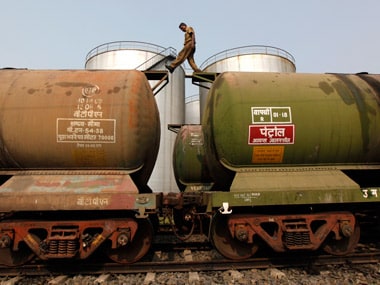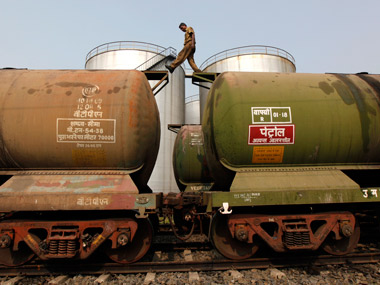The government is being slammed for Wednesday’s increase in the retail price of diesel and petrol. If you’re wondering why the government should face the flak, since the prices of both have been deregulated and are no longer subject to its diktat, there’s a reason. Oil marketing companies are all public sector ones, so, no matter what they and the government may claim, they don’t have complete pricing freedom. [caption id=“attachment_2668942” align=“alignleft” width=“380”]  Reuters[/caption] But the criticism is not just about the price increase, since people have got used to the ups and downs of fuel prices since they were freed up. The anger is because, starting November 2014, the government has been increasing excise duty on these two fuels regularly, depriving consumers the benefit of lower international oil prices. There have been five hikes since November 2015 alone, according to a State Bank of India economic research division note. Since the government has not been passing on the full benefit of falling crude prices to the consumers, the argument goes, it is unfair of it to pass on increases. According to the SBI note, the five hikes cumulatively result in an increase in excise duty of Rs 4.02 a litre on petrol and Rs 6.97 a litre on diesel. Without these increases, it estimates, the retail price could work out to Rs 47.63 a litre for petrol and that of diesel to Rs 38.96 a litre (against the actual price in February of Rs 59.63 for petrol and Rs 44.96 for diesel). This, the note calculates, would have put more money in people’s hands and given a much-needed consumption boost of 1 per cent of GDP to the economy. It certainly would have. But would it also not have encouraged an extravagant use of fuel? Public memory is short, but till not too many years back, the oil import bill was a constant source of worry on the balance of payments front. All discussion focussed on curbing consumption, whether by industry or retail consumers. There were exhortations on radio, television, traffic signals and petrol pumps to save every drop of fuel and tips about how to do that in our daily lives. In March 2014, the erstwhile Planning Commission unveiled a tool – India Energy Security Scenarios or IESS – which mapped four scenarios on energy consumption, warning that the least effort scenario could compromise our energy security, since India imports 80 percent of its petroleum needs. Since global oil prices started to fall, there has been no talk of all this. Consumption can never be curbed by exhortations alone. Pricing is the most effective way of doing that. In the days when petrol and diesel prices were fixed by the government, the fact that populism kept them artificially low attracted much criticism. It was often stressed that this encouraged wasteful consumption. Surely that argument is valid even today? With pricing being market-determined, excise duty becomes the only tool to influence consumption. According to latest data from the Petroleum Policy Analysis Cell, consumption of petrol in 2014-15 was 11.4 per cent higher than in 2013-14. But in the first 11 months (April-February) of 2015-16, consumption was 19.7 million metric tonnes (MMT), just 3.6 per cent higher than the full year consumption of 19 MMT in 2014-15. It is hardly likely that Indians will guzzle so much petrol in March so as to result in the full year consumption being more than 11 per cent higher than in 2014-15. It is quite possible that the excise duty hike may have had a subduing impact. What is also being forgotten is that when international prices were heading north, earlier governments did not pass on the entire cost to the consumers by lowering excise duty. When global prices start to increase again, there will be pressure on whichever government is then in power to cushion consumers from the price increase. So, if excise duty can be lowered when international prices are high, why can they not be raised when prices are at never-before lows? And let’s not forget that even with the excise duty hikes, people are paying less for fuel than they were a few years back. But there’s no clear evidence that the serial excise hikes are part of a larger plan on curbing consumption. Right now, it appears to be just another additional revenue mobilisation measure, at a time when the government’s expenditure commitments are increasing. It is as if the finance ministry decided that it was not fair that the public was going to enjoy the benefits of lower oil prices and that it should be part of the party as well. But since India is dependent for almost its entire fuel needs on imports, there is a case for the government working out a strategy on using excise to tweak petroleum prices, increasing duty when prices fall steeply and reducing them when they touch unaffordable levels, without interfering with the pricing autonomy of oil companies. Perhaps an appropriate (and politically acceptable) price band can be targeted and then excise used to keep it within that range. Working out such a strategy and widely publicising it will make both excise hikes and petrol price hikes politically acceptable. Otherwise, the government leaves itself open to the charge of ad-hocism.
The government is being slammed for Wednesday’s increase in the retail price of diesel and petrol. If you’re wondering why the government should face the flak, since the prices of both have been deregulated and are no longer subject to its diktat, there’s a reason. Oil marketing companies are all public sector ones, so, no matter what they and the government may claim, they don’t have complete pricing freedom. [caption id=“attachment_2668942” align=“alignleft” width=“380”] !
Advertisement
End of Article


)

)
)
)
)
)
)
)
)



